Civil servants have reacted with shock and anger after Boris Johnson announced that the Department for International Development (DfID) will be merged with the Foreign and Commonwealth Office (FCO) – having found out about the move via news reports.
The government has been accused of putting politics ahead of the needs of the world’s poorest by bringing together the two departments, in a move that is likely to see financial aid cut from a number of developing countries.
The FDA union, which represents senior civil servants, told The Independent it had not been consulted over the merger and found out about the decision via the media.
Download the new Independent Premium app
Sharing the full story, not just the headlines
“The staff were really upset and despondent yesterday afternoon, made worse by the fact we only found about this through the media before the employer told them,” said Allan Sampson, who represents members in DfID.
An all-staff meeting was not held until 3.30pm, Mr Sampson said, despite the prime minister announcing the merger in the Commons at 1.45pm, and news of the upcoming announcement having been reported by the BBC since midday.
Mr Johnson announced the creation of the new foreign, commonwealth and development office to “unite our aid with our diplomacy” – but The Independent has been told by one civil servant in DfID that the PM’s decision was grounded in “pure political ideology” and sought to “quell rumblings” among Tory backbenchers who object to the amount of money being spent on international development.
Work will begin immediately on shaping the new department, which is expected to be established by September.
However, The Independent understands that the PM, who acted alone in authorising the merger, has provided no instructions on how to facilitate this restructuring.
Instead, teams of civil servants working in both the FCO and DfID will be expected to formulate and deliver plans for the merger, at a time when these departments are already facing immense pressure to build post-Brexit relations, tackle humanitarian emergencies in countries such as Syria and Yemen and contribute to worldwide efforts to tackle the Covid-19 pandemic.
“We don’t know the size of the new department, we don’t know whether it’ll be the size of DfID and FCO combined, or whether it’ll be something smaller,” Mr Sampson said, adding that there was “uncertainty” for the 600 staff based in East Kilbride – a DfID office based in Scotland.
The latest news on Brexit, politics and beyond direct to your inbox
“They’ve been given some initial assurances about keeping East Kilbride open within the new department’s estate,” he said. “But it’s another unknown at this point.
“Staff have a fear for initial security in the usual way, but beyond that, there’s a fear that their new work will be quite different from what they’re doing now. They have a strong professional commitment to poverty reduction, and that’s why they’re in the department; they have decades’ worth of experience in that field. There’s a real concern any work they’re deployed to now will be very different.”
In a letter sent to senior management at DfID, and seen by The Independent, the FDA says “it will be important to embed key DFID values and aims into the new department”.
“We must be involved from the very outset and not simply informed when key decisions affecting our members have been taken,” it adds.


1/50 17 June 2020
Players kneel, as well as, having ‘Black Lives Matter’ in place of names on their shirts prior to the start of the Premier League match between Aston Villa and Sheffield United at Villa Park in Birmingham. The league resumed after its three-month suspension because of coronavirus
AP

2/50 16 June 2020
Motakhayyel ridden by Jim Crowley, right, wins the Buckingham Palace Handicap during day one of Royal Ascot. This year, the flat racing’s biggest meeting, is behind closed doors due to the coronavirus outbreak
PA

3/50 15 June 2020
Queues form at Primark at the Rushden Lakes shopping complex after the government relaxed coronavirus lockdown laws significantly, allowing zoos, safari parks and non-essential shops to open to visitors
Getty

4/50 14 June 2020
A man kneels at a commemoration to mark the third anniversary of the Grenfell Tower fire in London. The fire claimed 72 lives on 14 June 2017
PA

5/50 13 June 2020
Protesters confront police in Whitehall near Parliament Square, during a protest by the Democratic Football Lads Alliance
PA

6/50 12 June 2020
A Black Lives Matter supporter sings to crowds who marched with her in front of the National Gallery in Trafalgar Square in London. The death of an African American man, George Floyd, while in the custody of Minneapolis police has sparked protests across the United States, as well as demonstrations of solidarity in many countries around the world
Getty

7/50 11 June 2020
Scouts show their support at the Lord Baden-Powell statue in Poole. The statue of Robert Baden-Powell on Poole Quay is to be placed in “safe storage” following concerns about his racial views
Getty

8/50 10 June 2020
Social distancing markers around the penguin enclosure at London Zoo. Staff have been preparing and are now ready for reopening next week with new signage, one-way trails for visitors to follow, and extra handwashing and sanitiser stations in place
PA

9/50 9 June 2020
Protestors hold placards and shout slogans during during a protest called by the Rhodes Must Fall campaign calling for the removal of the statue of British imperialist Cecil John Rhodes outside Oriel College, at the University of Oxford
AFP via Getty

10/50 8 June 2020
Hermione Wilson helps to install a new artwork at Jupiter Artland, Edinburgh, created as a tribute to the NHS titled “A Thousand Thank Yous” originally devised by the late Allan Kaprow which consists of colourful painted messages on cardboard and has been directed remotely by London-based artist Peter Liversidge
PA

11/50 7 June 2020
The Edward Colston statue has been pulled down by Black Lives Matter protesters in Bristol. Colston was a 17th century slave trader who has numerous landmarks named after him in Bristol
SWNS

12/50 6 June 2020
Children pose for their family in front of discarded placards fixed on a wall in Piccadilly Gardens after a Black Lives Matter demonstrations in Manchester. The death of an African-American man, George Floyd, while in the custody of Minneapolis police has sparked protests across the United States, as well as demonstrations of solidarity in many countries around the world
Getty
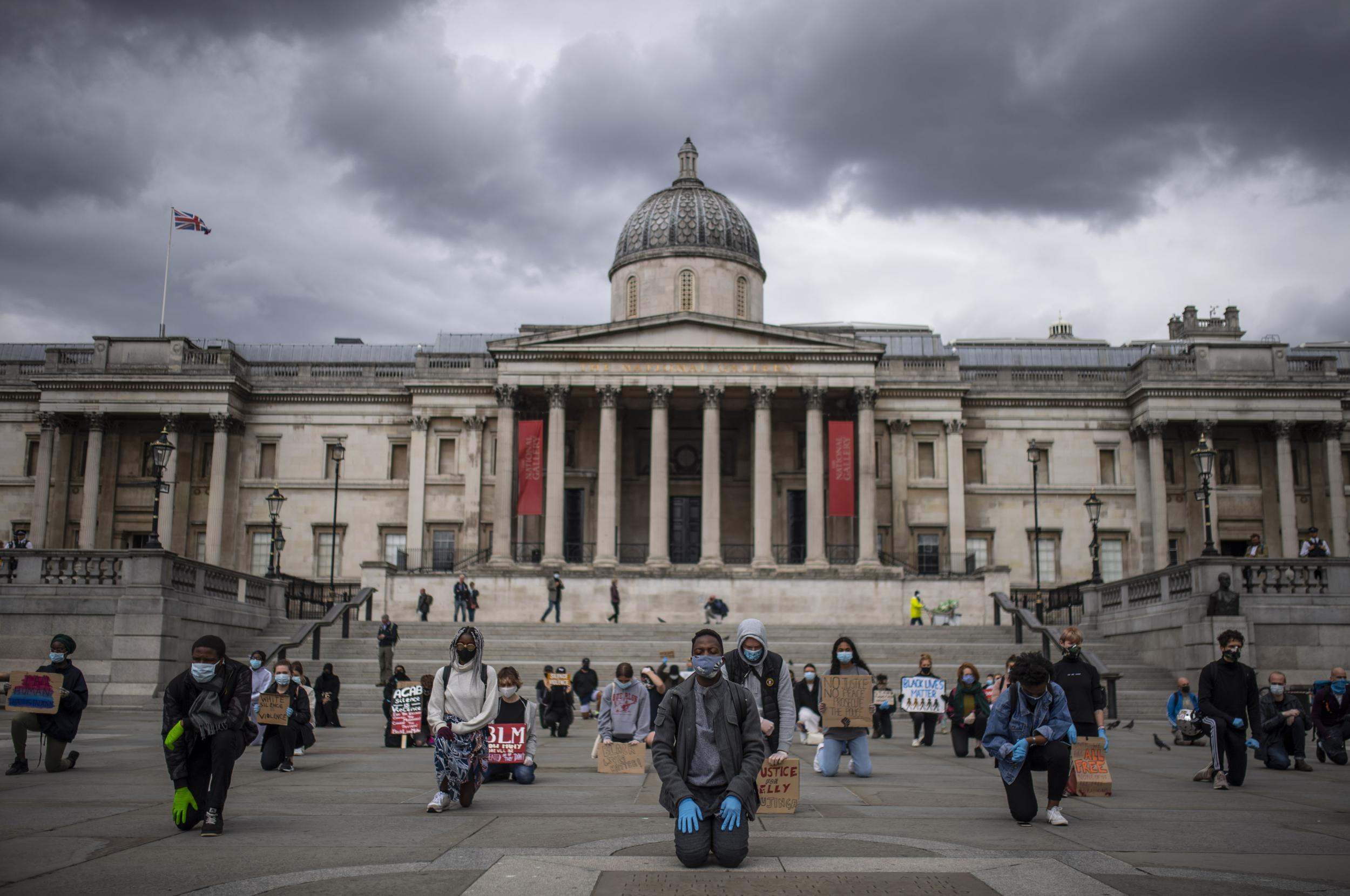
13/50 5 June 2020
Protesters kneel in Trafalgar Square during a Black Lives Matter demonstration in London, England. The death of an African-American man, George Floyd, while in the custody of Minneapolis police has sparked protests across the United States, as well as demonstrations of solidarity in many countries around the world
Getty

14/50 4 June 2020
Protestors march from Windsor Castle in solidarity with the Black Lives Matter movement
Getty

15/50 3 June 2020
People wearing face masks hold banners in Hyde Park during a Black Lives Matter protest following the death of George Floyd who died in police custody in Minneapolis
Reuters

16/50 2 June 2020
Street artist Nath Murdoch touches up his anti-racism mural in Peterborough, Cambridgeshire
PA

17/50 1 June 2020
Customers socially distance themselves as they queue to enter Ikea in Warrington. The store opening saw large queues of people and traffic on adjacent roads as it reopened after the lockdown. The furniture and housewares chain reopened its stores across England and Northern Ireland subject to several restrictions, keeping its restaurants closed and asking customers to shop alone
Getty

18/50 31 May 2020
A man wearing a protective face mask kneels in front of police officers during a protest against the death in Minneapolis police custody of African-American man George Floyd near the U.S. Embassy, London, Britai
Reuters

19/50 30 May 2020
Visitors at Grassholme Reservoir in Lunedale, Co Durham are able to cross an ancient packhorse bridge as work on the dam wall means water levels have dropped signifcantly to reveal this monument of the pas
UK

20/50 29 May 2020
British Tennis player Maia Lumsden in action at Bridge of Allan Tennis Club. People can meet family and friends outdoors and play sports such as golf and tennis again as the country is moving into phase one of the Scottish Government’s plan for gradually lifting lockdown
PA

21/50 28 May 2020
A police frogman, searches for a weapon in Abington Lake in in Northampton
Getty
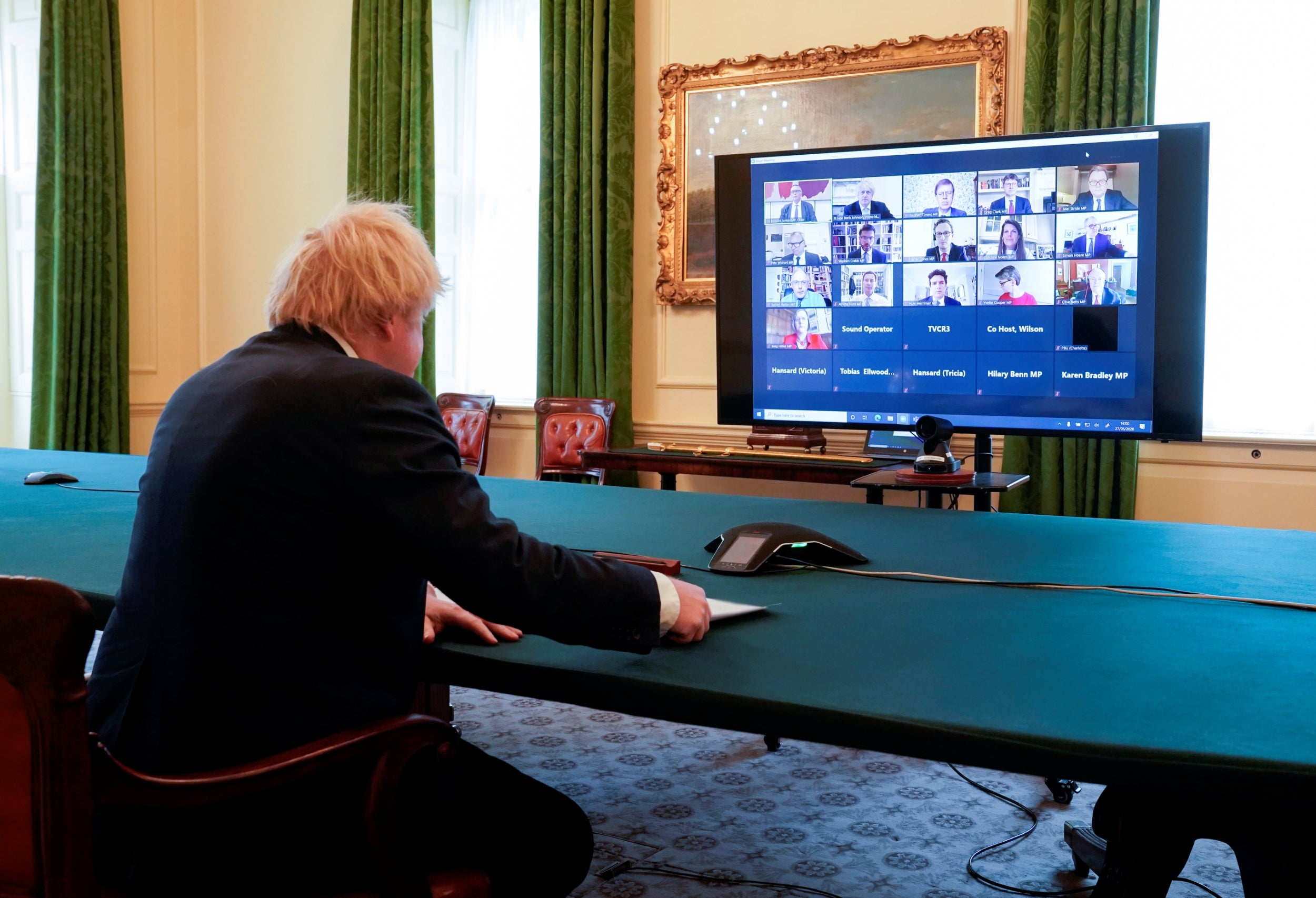
22/50 27 May 2020
Prime Minister Boris Johnson appears before the Liaison Committee via Zoom from the cabinet room at 10 Downing Street, amid the coronavirus
10 Downing Street/Reuters

23/50 26 May 2020
Members of the public relax on the beach at Botany Bay in Margate
Getty
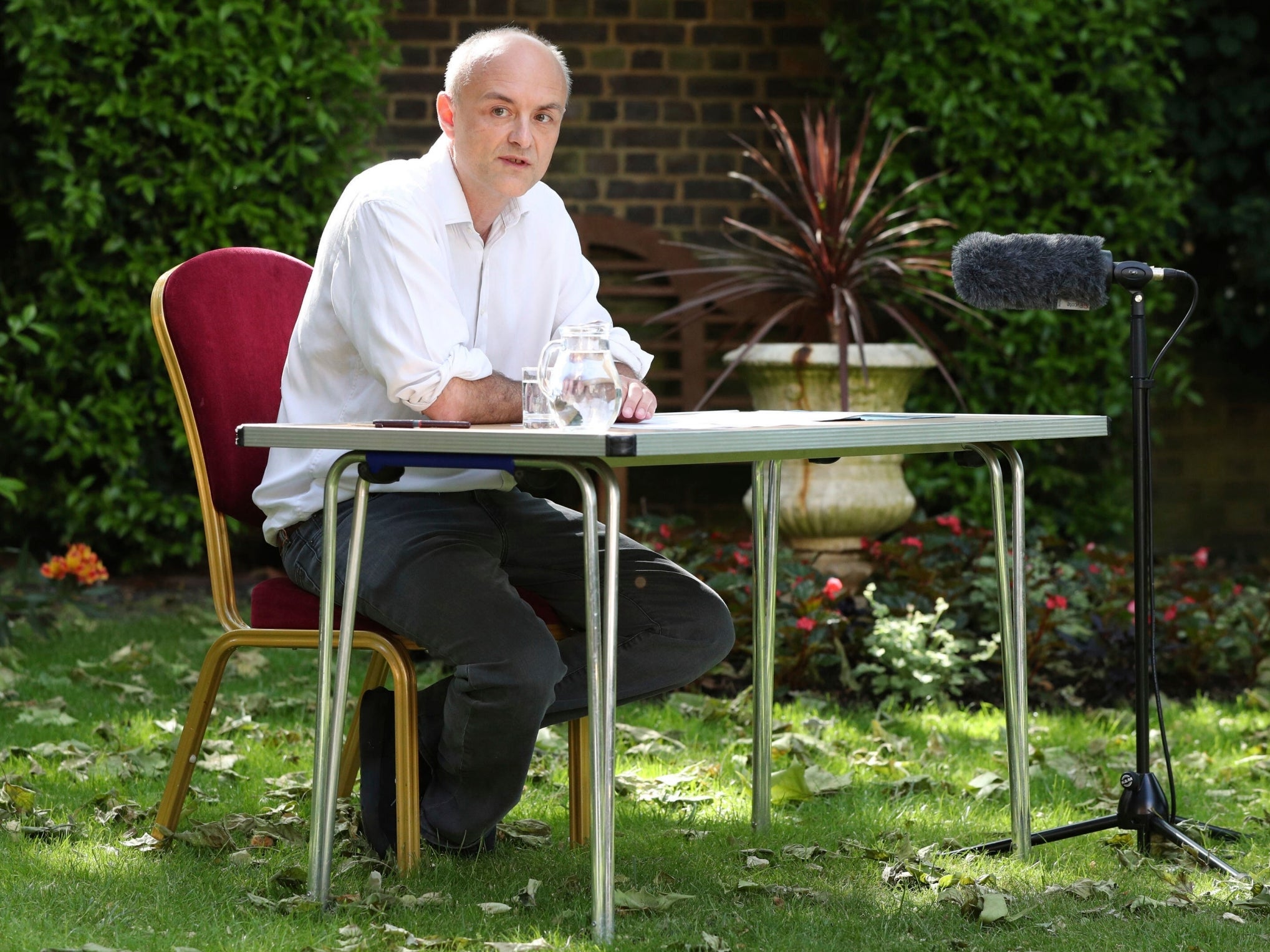
24/50 25 May 2020
Dominic Cummings, senior aide to Prime Minister Boris Johnson, makes a statement inside 10 Downing Street, London, over allegations he breached coronavirus lockdown restrictions
AP
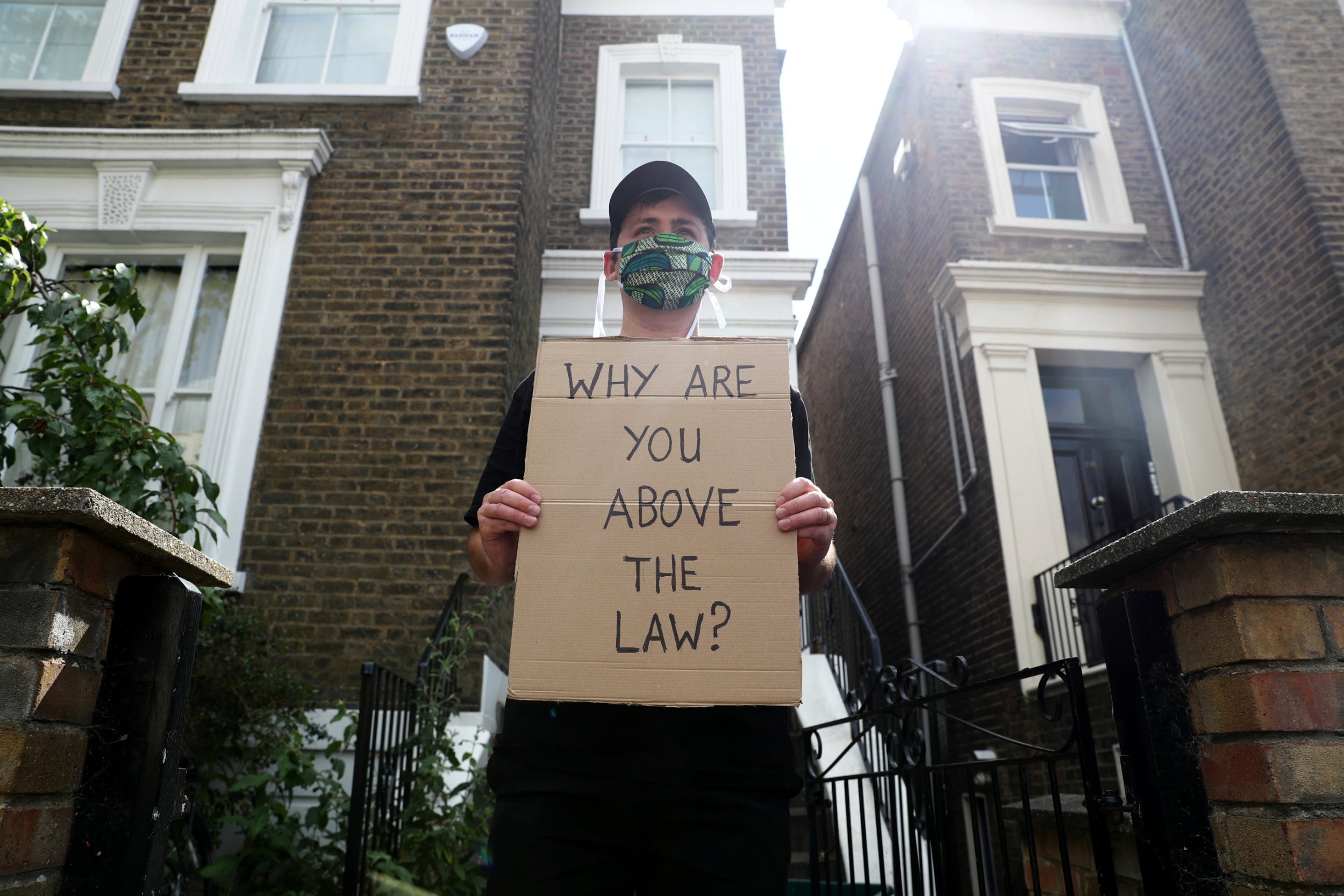
25/50 24 May 2020
A demonstrator holds a sign reading ‘Why are you above the law?’ outside the house of Dominic Cummings in London, following allegations Cummings broke coronavirus lockdown rules by travelling across the country
Reuters

26/50 23 May 2020
People take a walk near Durdle Door as cows graze in Lulworth
Reuters

27/50 22 May 2020
Waves break onto a wall at Brighton beach
Reuters

28/50 21 May 2020
Cafe owner Francini Osorio serves customers in a trial phase during the coronavirus lockdown. Osorio has installed an air purifier and 35 clear shower curtains, which will divide customers and tables, in the Francini Cafe De Colombia, Worcester, ready for the re-opening of his business as lockdown restrictions are eased
PA

29/50 20 May 2020
People at Bournemouth beach in Dorset, as people flock to parks and beaches with lockdown measures eased. The Met Office has predicted the hottest day of the year
PA

30/50 19 May 2020
A dog jumps into the water as families relax at a Lido in London
AP

31/50 18 May 2020
A fan celebrates outside Celtic Park after Celtic were crowned champions of the Scottish Premiership. Hearts were also relegated after a decision was made to conclude the season with immediate effect
PA

32/50 17 May 2020
People on Brighton beach after the introduction of measures to bring the country out of lockdown
PA

33/50 16 May 2020
Police lead away Piers Corbyn, brother of former Labour leader Jeremy Corbyn, as protesters gather in breach of lockdown rules in Hyde Park in London after the introduction of measures to bring the country out of lockdown.
PA

34/50 15 May 2020
Estonian freelance ballet dancer and choreographer, Eve Mutso performs her daily fitness routine near her home in Glasgow, Scotland
Getty

35/50 14 May 2020
Senior charge nurse Jan Ferguson views artwork “Theatre of Dott’s” by Kate Ive, inspired by Professor Norman Dott and his neurosurgery theatres at the Western General from 1960-2019. It is one of a number of artworks which sit on the walls of NHS Lothians’ Department of Clinical Neurosciences (DCN) which has been transferred into a purpose-built new home on the Little France campus in Edinburgh
PA

36/50 13 May 2020
Team GB’s karate athlete Jordan Thomas trains outside his apartment in Manchester
Reuters

37/50 12 May 2020
Nurses from central London hospitals protest on international nurses day about the chronic underfunding of the NHS and other issues surrounding the health service outside the gates of Downing Street, London
PA

38/50 11 May 2020
Waves crash at Tynemouth pier on the North East coast
PA

39/50 10 May 2020
A woman passes street art and a poster in East London
Reuters

40/50 9 May 2020
Police patrol the beach in Brighton
Getty

41/50 8 May 2020
The British Royal Air Force Red Arrows conduct a fly past over the statue of former British Prime Minister Winston Churchill in London to commemorate the 75th Anniversary of Victory in Europe (VE Day) in Britain
MOD/Reuters

42/50 7 May 2020
Team GB sailor Eilidh McIntyre during a training session at her home in Portsmouth
Reuters
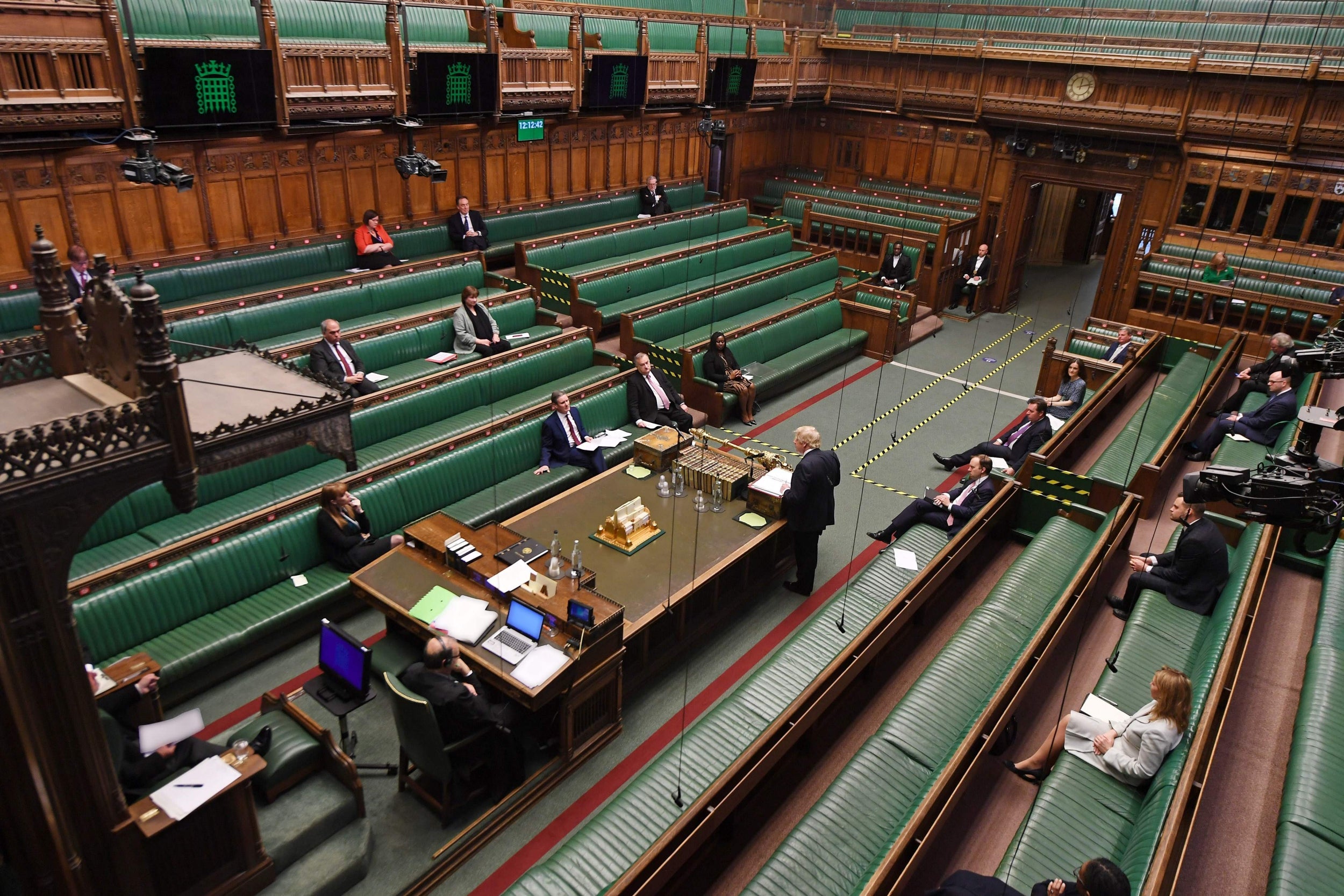
43/50 6 May 2020
Labour Party leader Keir Starmer listens to Prime Minister Boris Johnson speaking during PMQs
UK Parliament/AFP/Getty

44/50 5 May 2020
The sun appears to explode over the horizon in this montage of images captured by photographer Nick Lucas near his home in Ringwood, Hampshire. Nick took a number of pictures just a few seconds apart on a tripod mounted camera which were then combined to give the eye catching dawn image
Nick Lucas/SWNS

45/50 4 May 2020
Leeds Green Watch firefighters observe a minute’s silence outside the fire station in Kirkstall Rd, in memory their colleagues that lost their lives in the line of duty
PA

46/50 3 May 2020
Staff at The Berkeley hotel give food to ambulance workers
Reuters

47/50 2 May 2020
One of a small group of anti-lockdown protesters speaks to a police officer as they gather outside New Scotland Yard in Victoria, London
AFP via Getty

48/50 1 May 2020
Bonnie the Llama grazes in a field in the Scottish Borders alongside a sign supporting the NHS as the UK continues in lockdown
PA

49/50 30 April 2020
Colonel Tom Moore and his daughter Hannah celebrate his 100th birthday, with an RAF flypast provided by a Spitfire and a Hurricane over his home in Marston Moretaine. Colonel Moore, formerly a Captain, received a promotion in honour of his birthday and in recognition of the funds, in excess of £30m, he raised for the NHS by walking laps of his garden
Capture the Light Photography/Getty
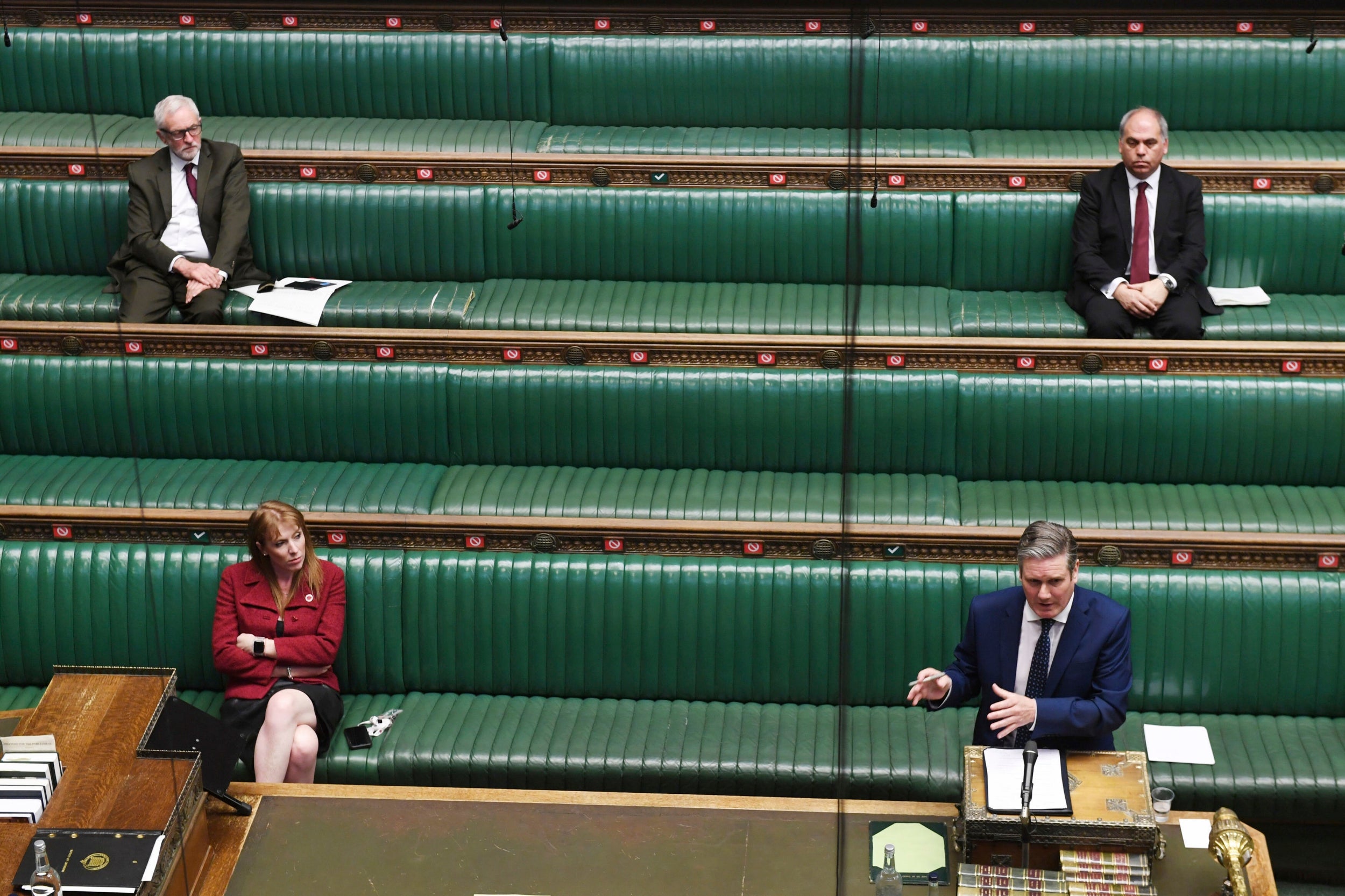
50/50 29 April 2020
Britain’s Labour leader Keir Starmer speaks during Prime Minister’s Questions, as members of Parliament observe social distancing due to the coronavirus, in the House of Commons, London, Wednesday, April 29, 2020
UK Parliament/AP

1/50 17 June 2020
Players kneel, as well as, having ‘Black Lives Matter’ in place of names on their shirts prior to the start of the Premier League match between Aston Villa and Sheffield United at Villa Park in Birmingham. The league resumed after its three-month suspension because of coronavirus
AP

2/50 16 June 2020
Motakhayyel ridden by Jim Crowley, right, wins the Buckingham Palace Handicap during day one of Royal Ascot. This year, the flat racing’s biggest meeting, is behind closed doors due to the coronavirus outbreak
PA

3/50 15 June 2020
Queues form at Primark at the Rushden Lakes shopping complex after the government relaxed coronavirus lockdown laws significantly, allowing zoos, safari parks and non-essential shops to open to visitors
Getty

4/50 14 June 2020
A man kneels at a commemoration to mark the third anniversary of the Grenfell Tower fire in London. The fire claimed 72 lives on 14 June 2017
PA

5/50 13 June 2020
Protesters confront police in Whitehall near Parliament Square, during a protest by the Democratic Football Lads Alliance
PA

6/50 12 June 2020
A Black Lives Matter supporter sings to crowds who marched with her in front of the National Gallery in Trafalgar Square in London. The death of an African American man, George Floyd, while in the custody of Minneapolis police has sparked protests across the United States, as well as demonstrations of solidarity in many countries around the world
Getty

7/50 11 June 2020
Scouts show their support at the Lord Baden-Powell statue in Poole. The statue of Robert Baden-Powell on Poole Quay is to be placed in “safe storage” following concerns about his racial views
Getty

8/50 10 June 2020
Social distancing markers around the penguin enclosure at London Zoo. Staff have been preparing and are now ready for reopening next week with new signage, one-way trails for visitors to follow, and extra handwashing and sanitiser stations in place
PA

9/50 9 June 2020
Protestors hold placards and shout slogans during during a protest called by the Rhodes Must Fall campaign calling for the removal of the statue of British imperialist Cecil John Rhodes outside Oriel College, at the University of Oxford
AFP via Getty

10/50 8 June 2020
Hermione Wilson helps to install a new artwork at Jupiter Artland, Edinburgh, created as a tribute to the NHS titled “A Thousand Thank Yous” originally devised by the late Allan Kaprow which consists of colourful painted messages on cardboard and has been directed remotely by London-based artist Peter Liversidge
PA

11/50 7 June 2020
The Edward Colston statue has been pulled down by Black Lives Matter protesters in Bristol. Colston was a 17th century slave trader who has numerous landmarks named after him in Bristol
SWNS

12/50 6 June 2020
Children pose for their family in front of discarded placards fixed on a wall in Piccadilly Gardens after a Black Lives Matter demonstrations in Manchester. The death of an African-American man, George Floyd, while in the custody of Minneapolis police has sparked protests across the United States, as well as demonstrations of solidarity in many countries around the world
Getty

13/50 5 June 2020
Protesters kneel in Trafalgar Square during a Black Lives Matter demonstration in London, England. The death of an African-American man, George Floyd, while in the custody of Minneapolis police has sparked protests across the United States, as well as demonstrations of solidarity in many countries around the world
Getty

14/50 4 June 2020
Protestors march from Windsor Castle in solidarity with the Black Lives Matter movement
Getty

15/50 3 June 2020
People wearing face masks hold banners in Hyde Park during a Black Lives Matter protest following the death of George Floyd who died in police custody in Minneapolis
Reuters

16/50 2 June 2020
Street artist Nath Murdoch touches up his anti-racism mural in Peterborough, Cambridgeshire
PA

17/50 1 June 2020
Customers socially distance themselves as they queue to enter Ikea in Warrington. The store opening saw large queues of people and traffic on adjacent roads as it reopened after the lockdown. The furniture and housewares chain reopened its stores across England and Northern Ireland subject to several restrictions, keeping its restaurants closed and asking customers to shop alone
Getty

18/50 31 May 2020
A man wearing a protective face mask kneels in front of police officers during a protest against the death in Minneapolis police custody of African-American man George Floyd near the U.S. Embassy, London, Britai
Reuters

19/50 30 May 2020
Visitors at Grassholme Reservoir in Lunedale, Co Durham are able to cross an ancient packhorse bridge as work on the dam wall means water levels have dropped signifcantly to reveal this monument of the pas
UK

20/50 29 May 2020
British Tennis player Maia Lumsden in action at Bridge of Allan Tennis Club. People can meet family and friends outdoors and play sports such as golf and tennis again as the country is moving into phase one of the Scottish Government’s plan for gradually lifting lockdown
PA

21/50 28 May 2020
A police frogman, searches for a weapon in Abington Lake in in Northampton
Getty

22/50 27 May 2020
Prime Minister Boris Johnson appears before the Liaison Committee via Zoom from the cabinet room at 10 Downing Street, amid the coronavirus
10 Downing Street/Reuters

23/50 26 May 2020
Members of the public relax on the beach at Botany Bay in Margate
Getty

24/50 25 May 2020
Dominic Cummings, senior aide to Prime Minister Boris Johnson, makes a statement inside 10 Downing Street, London, over allegations he breached coronavirus lockdown restrictions
AP

25/50 24 May 2020
A demonstrator holds a sign reading ‘Why are you above the law?’ outside the house of Dominic Cummings in London, following allegations Cummings broke coronavirus lockdown rules by travelling across the country
Reuters

26/50 23 May 2020
People take a walk near Durdle Door as cows graze in Lulworth
Reuters

27/50 22 May 2020
Waves break onto a wall at Brighton beach
Reuters

28/50 21 May 2020
Cafe owner Francini Osorio serves customers in a trial phase during the coronavirus lockdown. Osorio has installed an air purifier and 35 clear shower curtains, which will divide customers and tables, in the Francini Cafe De Colombia, Worcester, ready for the re-opening of his business as lockdown restrictions are eased
PA

29/50 20 May 2020
People at Bournemouth beach in Dorset, as people flock to parks and beaches with lockdown measures eased. The Met Office has predicted the hottest day of the year
PA

30/50 19 May 2020
A dog jumps into the water as families relax at a Lido in London
AP

31/50 18 May 2020
A fan celebrates outside Celtic Park after Celtic were crowned champions of the Scottish Premiership. Hearts were also relegated after a decision was made to conclude the season with immediate effect
PA

32/50 17 May 2020
People on Brighton beach after the introduction of measures to bring the country out of lockdown
PA

33/50 16 May 2020
Police lead away Piers Corbyn, brother of former Labour leader Jeremy Corbyn, as protesters gather in breach of lockdown rules in Hyde Park in London after the introduction of measures to bring the country out of lockdown.
PA

34/50 15 May 2020
Estonian freelance ballet dancer and choreographer, Eve Mutso performs her daily fitness routine near her home in Glasgow, Scotland
Getty

35/50 14 May 2020
Senior charge nurse Jan Ferguson views artwork “Theatre of Dott’s” by Kate Ive, inspired by Professor Norman Dott and his neurosurgery theatres at the Western General from 1960-2019. It is one of a number of artworks which sit on the walls of NHS Lothians’ Department of Clinical Neurosciences (DCN) which has been transferred into a purpose-built new home on the Little France campus in Edinburgh
PA

36/50 13 May 2020
Team GB’s karate athlete Jordan Thomas trains outside his apartment in Manchester
Reuters

37/50 12 May 2020
Nurses from central London hospitals protest on international nurses day about the chronic underfunding of the NHS and other issues surrounding the health service outside the gates of Downing Street, London
PA

38/50 11 May 2020
Waves crash at Tynemouth pier on the North East coast
PA

39/50 10 May 2020
A woman passes street art and a poster in East London
Reuters

40/50 9 May 2020
Police patrol the beach in Brighton
Getty

41/50 8 May 2020
The British Royal Air Force Red Arrows conduct a fly past over the statue of former British Prime Minister Winston Churchill in London to commemorate the 75th Anniversary of Victory in Europe (VE Day) in Britain
MOD/Reuters

42/50 7 May 2020
Team GB sailor Eilidh McIntyre during a training session at her home in Portsmouth
Reuters

43/50 6 May 2020
Labour Party leader Keir Starmer listens to Prime Minister Boris Johnson speaking during PMQs
UK Parliament/AFP/Getty

44/50 5 May 2020
The sun appears to explode over the horizon in this montage of images captured by photographer Nick Lucas near his home in Ringwood, Hampshire. Nick took a number of pictures just a few seconds apart on a tripod mounted camera which were then combined to give the eye catching dawn image
Nick Lucas/SWNS

45/50 4 May 2020
Leeds Green Watch firefighters observe a minute’s silence outside the fire station in Kirkstall Rd, in memory their colleagues that lost their lives in the line of duty
PA

46/50 3 May 2020
Staff at The Berkeley hotel give food to ambulance workers
Reuters

47/50 2 May 2020
One of a small group of anti-lockdown protesters speaks to a police officer as they gather outside New Scotland Yard in Victoria, London
AFP via Getty

48/50 1 May 2020
Bonnie the Llama grazes in a field in the Scottish Borders alongside a sign supporting the NHS as the UK continues in lockdown
PA

49/50 30 April 2020
Colonel Tom Moore and his daughter Hannah celebrate his 100th birthday, with an RAF flypast provided by a Spitfire and a Hurricane over his home in Marston Moretaine. Colonel Moore, formerly a Captain, received a promotion in honour of his birthday and in recognition of the funds, in excess of £30m, he raised for the NHS by walking laps of his garden
Capture the Light Photography/Getty

50/50 29 April 2020
Britain’s Labour leader Keir Starmer speaks during Prime Minister’s Questions, as members of Parliament observe social distancing due to the coronavirus, in the House of Commons, London, Wednesday, April 29, 2020
UK Parliament/AP
For now, the government’s financial commitment to foreign aid remains at 0.7 per cent of GDP, but those in DfID have expressed concern that this figure might be cut in the near future.
Mr Johnson hinted at cuts to aid budgets on Tuesday, saying Dominic Raab, who will head the new Whitehall department, “will be empowered to decide which countries receive – or cease to receive – British aid”.
The PM also questioned why countries like Zambia and Tanzania received more funding than Ukraine and the Western Balkans, which are strategically important to the UK.
He added that overseas aid provided through DfID had been treated for too long like a “cashpoint in the sky”.
Civil servants in the department said the criticism smarted – especially after then receiving an internal letter from the PM in which he praised their contributions to Britain’s work abroad, The Independent understands.
Some civil servants in DfID are now considering taking voluntary redundancies or pushing to work in other departments, rather than aligning themselves with the FCO, The Independent understands.
Sources in Whitehall and charity experts have noted that while DfID is recognised internationally for its expertise in development, the Foreign Office lacks the same experience, transparency and progressive outlooks as its counterpart.
Mark Sheard, the CEO of World Vision UK, said that giving the foreign secretary oversight of aid would mean less effectiveness and accountability, “and risk money being diverted to address UK foreign policy interests rather than alleviating poverty”.
“The definition of aid must not be diluted, and it must not become a weapon of foreign policy,” he added.
Three former prime ministers have all condemned Tuesday’s announcement, with David Cameron notably joining Tony Blair and Gordon Brown to criticise Mr Johnson.
“The decision to merge the departments is a mistake,” Mr Cameron said, in his first public rebuke of the PM.
“More could and should be done to coordinate aid and foreign policy, including through the National Security Council, but the end of DfID will mean less expertise, less voice for development at the top table and ultimately less respect for the UK overseas.”
Justine Greening, a former Tory international development secretary, told The Independent that the government “should be totally focused on steering our country through the huge challenges we face right now – the health impact of Covid, getting our kids back into school and preventing the worst unemployment crisis in a generation that will hit young people and the lowest paid the hardest.
“People will find it hard to see why it’s a priority to have a departmental reorganisation when ministers are so clearly already stretched.”
Mr Blair, who created the department in 1997, said he was “utterly dismayed by the decision to abolish DfID”.
“It is a leader in both programmes and thought in development, helping millions of the world’s most vulnerable to be relieved of poverty and killer diseases,” he added.
“The strategic aims of alignment with diplomacy and focus on new areas of strategic interest to Britain could be accomplished without its abolition. Wrong and regressive move.”



